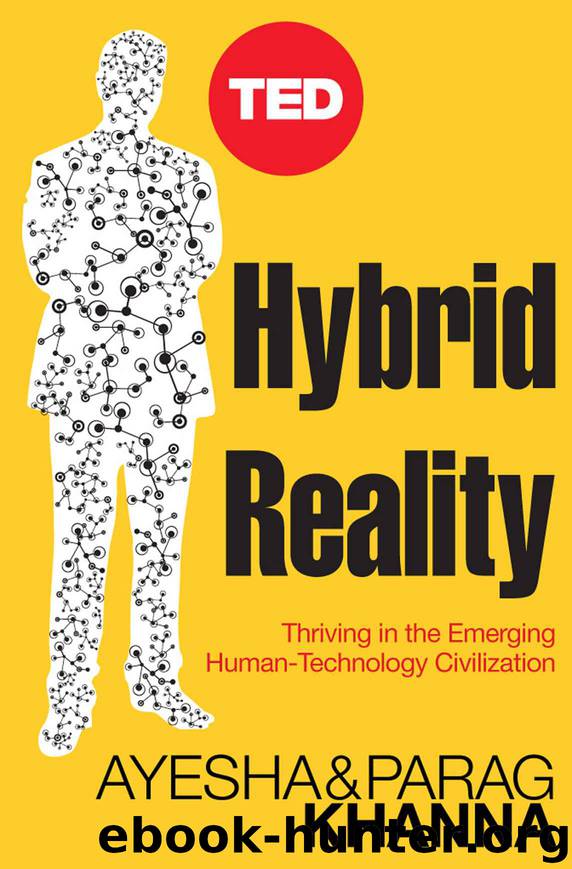Hybrid Reality: Thriving in the Emerging Human-Technology Civilization (TED Books) by Khanna Parag & Ayesha Khanna

Author:Khanna, Parag & Ayesha Khanna [Khanna, Parag]
Language: eng
Format: epub
Publisher: TED Conferences
Published: 2012-05-21T00:00:00+00:00
From treatment to enhancement
All our natural biological processes are increasingly subject to technological intrusion. Proteus Biomedical, for example, embeds sensors inside drugs that send signals when they are ingested and activate diagnostic patches on the skin that measure the body’s response and vital signs. But ever more sophisticated technologies are also pushing our medical capabilities across the threshold from treatment to enhancement: improving our physical and cognitive abilities beyond genetically predetermined capacity. As medical fields synergize, private laboratories undertake cutting-edge research, and peer-to-peer health communities collect and share data, our medical system is becoming ever more generative and subtly supporting this shift toward a culture of enhancement.
New biomedical frontiers are constantly being crossed as technological fields advance and combine. For instance, on the heels of genome-mapping efforts, neuroscientists have begun to map the dense “connectome” of 100 billion neurons in the brain, research that holds the potential to explain and manipulate consciousness. Drugs could isolate the parts of the brain where trauma is registered and remembered, and induce them to selectively “forget” stressful memories. The new field of optogenetics allows us to further control neurons, possibly enabling us to address psychiatric disorders, develop stimulation therapies for Parkinson’s disease, or even cure paralysis.
We are also moving closer to the widespread possibility of not just repairing our bodies but augmenting them. Biomechatronics, for example, brings together biology, electrical engineering, and mechanical physics to create lifelike prostheses that are almost as good as our natural human limbs. What began as MIT professor Hugh Herr’s modest effort to create more functional artificial limbs for amputees — starting with himself — has yielded powerful and upgradable bionic body-parts. Improvements in brain-computer interfaces (BCI) could lead to neuroprostheses that further enhance any deficient senses.
Another new hybrid field is bioengineering, in which stem cells are used to create new microbes and tissue that, with molecular printing, can generate complete new organs or body parts from scratch. Jaws, tracheas, and other parts destined for transplant have already been created using entirely synthetic processes. It is not implausible that this could one day eliminate the waiting time more than 100,000 Americans currently face for organ transplants.
Ironically, it is such critically ill patients who may be the first large-scale recipients of biomechatronic and bioengineering enhancements, because these are incorporated into their life-saving treatments. For example, amputees are receiving prostheses that could one day allow them to run faster than they did with their original limbs, and blood transfusions could potentially be enhanced by respirocyte nanobots that filter oxygen hundreds of times more efficiently than our red blood cells, meaning that we could run a sprint or swim under water for hours on end.
Eventually, the combination of bioengineering, optogenetics, and neuroprosthetics could create the possibility of turning humanity into a kind of cyborg with regenerative parts that would make us effectively immune to aging and disease. And where computational biology and genetics come together, we gain the possibility to “write” our DNA (as Celera Genomics founder Craig Venter is pursuing). Bioengineering
Download
This site does not store any files on its server. We only index and link to content provided by other sites. Please contact the content providers to delete copyright contents if any and email us, we'll remove relevant links or contents immediately.
Bad Blood by John Carreyrou(6607)
Rich Dad Poor Dad by Robert T. Kiyosaki(6590)
Principles: Life and Work by Ray Dalio(6399)
Playing to Win_ How Strategy Really Works by A.G. Lafley & Roger L. Martin(6201)
Management Strategies for the Cloud Revolution: How Cloud Computing Is Transforming Business and Why You Can't Afford to Be Left Behind by Charles Babcock(4562)
The Confidence Code by Katty Kay(4242)
Thinking in Bets by Annie Duke(4212)
American Kingpin by Nick Bilton(3866)
Delivering Happiness by Tony Hsieh(3408)
Project Animal Farm: An Accidental Journey into the Secret World of Farming and the Truth About Our Food by Sonia Faruqi(3208)
The Power of Habit by Charles Duhigg(3119)
The Tyranny of Metrics by Jerry Z. Muller(3055)
Brotopia by Emily Chang(3045)
The Marketing Plan Handbook: Develop Big-Picture Marketing Plans for Pennies on the Dollar by Robert W. Bly(3034)
Mastering Bitcoin: Programming the Open Blockchain by Andreas M. Antonopoulos(3032)
I Live in the Future & Here's How It Works by Nick Bilton(2977)
The Content Trap by Bharat Anand(2912)
Applied Empathy by Michael Ventura(2884)
Building a StoryBrand by Donald Miller(2883)
